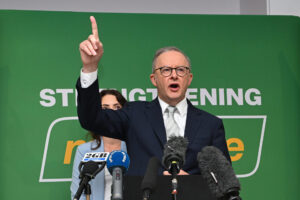The big banks have just discovered what Australia’s unemployed have known for some time, in modern Australia it is risky to be the underdog. For the last decade, at least, Australian politics has revolved around what you can get away with, not what the country needs, and the results have been nasty. And as the Treasurer made clear last week, it’s now the banks turn.
[This article was first published by the Australian Financial Reveiw – Here]
There are 750,000 unemployed people in Australia, up from 690,000 when Tony Abbott was elected in 2013. The unemployment benefit of $267 per week is less than a federal politician gets for spending one night in Canberra. But despite the fact that unemployment benefits account for less than 2 per cent of government spending each year, “dole bludgers” are singled out for a rhetorical and policy thumping. This year it’s drug testing.
No economist really believes that Australia’s rising unemployment is caused by excessively generous benefits. But last year, when the big four banks were campaigning for their $7.4 billion share of the corporate tax cuts they were strangely silent about the need to help the most vulnerable people in the country. I didn’t hear them tell the government to back off from its attacks on the vulnerable after the 2014 budget either.
In politics you eventually reap what you sow. The big four banks are now trying to run the argument that the rest of the community should join their campaign against Treasurer Morrison’s $6 billion bank super profits tax, lest they be next. But opinion polls make clear that the average Australian cares even less about the banks than they do about the unemployed.
Unsurprisingly, the BCA has run to the defence of its biggest members, with Jennifer Westacott arguing “Are we going to go back to a mining tax? Do we go to other parts of the economy that are making big profits? … Where does this stop?”
Good question; why should it stop at the banks? Extending it to big miners would be good policy and good politics too. The fact that Chevron pays no income tax and gets its oil and gas for free makes the ‘miners are paying their share’ argument a bit hard to run these days.
Not a new idea
Just because an idea is popular doesn’t mean that it is populist. The idea of super profits taxes has a long history in the economics profession and there is little doubt that the introduction of a super profits tax on the mining or banking industry would have smaller economic costs than a tax that raised the same amount of revenue from wages.
The Australia Institute first called for a super profits tax on the big banks back in 2010 on the basis that 20 years of so-called “competition policy” had failed to deliver any significant competition in the banking industry which was, and still is, among the most concentrated and profitable in the world.
It will be interesting to see whether the rest of the business community follows the BCA into the defence of the big banks or whether they can actually see the enormous opportunity the Treasurer has just presented them with. Put simply, if the rest of the big business community is serious about getting the corporate tax rate cut then they should be relieved to see that it can be made much more affordable, and much more popular, if the big banks and the big miners are required to pay a fairer share.
The dominance of the big four banks and the big two miners over the Australian business community, and the ASX, is unique in developed countries. And in turn it has distorted the Australian political debate about what is “good for the economy” into a narrow debate about “what can the bankers and miners agree on”.
The willingness of the Coalition to tax the super profits of the banks and the ALP’s willingness to tax the super profits of the miners present the broader Australian business community with an incredible opportunity to push for good policy in the form of rent taxes that the reaction to the budget makes clear would also be good politics.
The BCA approach to collective bargaining on policy has had a stultifying, and simplifying, impact on policy debate. Just as there is not one set of working conditions that is good for all workers, there has never been a set of tax policies that is good for all businesses. It will be fascinating to see whether the business community is agile enough to take advantage of the new terrain or if they simply resort to form and threaten another capital strike.
Richard Denniss is the chief economist for The Australia Institute
AFR Contributor
Between the Lines Newsletter
The biggest stories and the best analysis from the team at the Australia Institute, delivered to your inbox every fortnight.
You might also like
Why a fossil fuel-free COP could put Australia’s bid over the edge
When the medical world hosts a conference on quitting smoking, they don’t invite Phillip Morris, or British American Tobacco along to help “be part of the solution”.
5 ways and 63 billion reasons to improve Australia’s tax system
With a federal election just around the corner, new analysis from The Australia Institute reveals 63 billion reasons why our next Parliament should improve the nation’s tax system.
Business groups want the government to overhaul the tax system? Excellent – we have some ideas.
The landslide win by the ALP has seen business groups come out demanding the government listen to their demands despite having provided them no support, and plenty of opposition, over the past 3 years.



